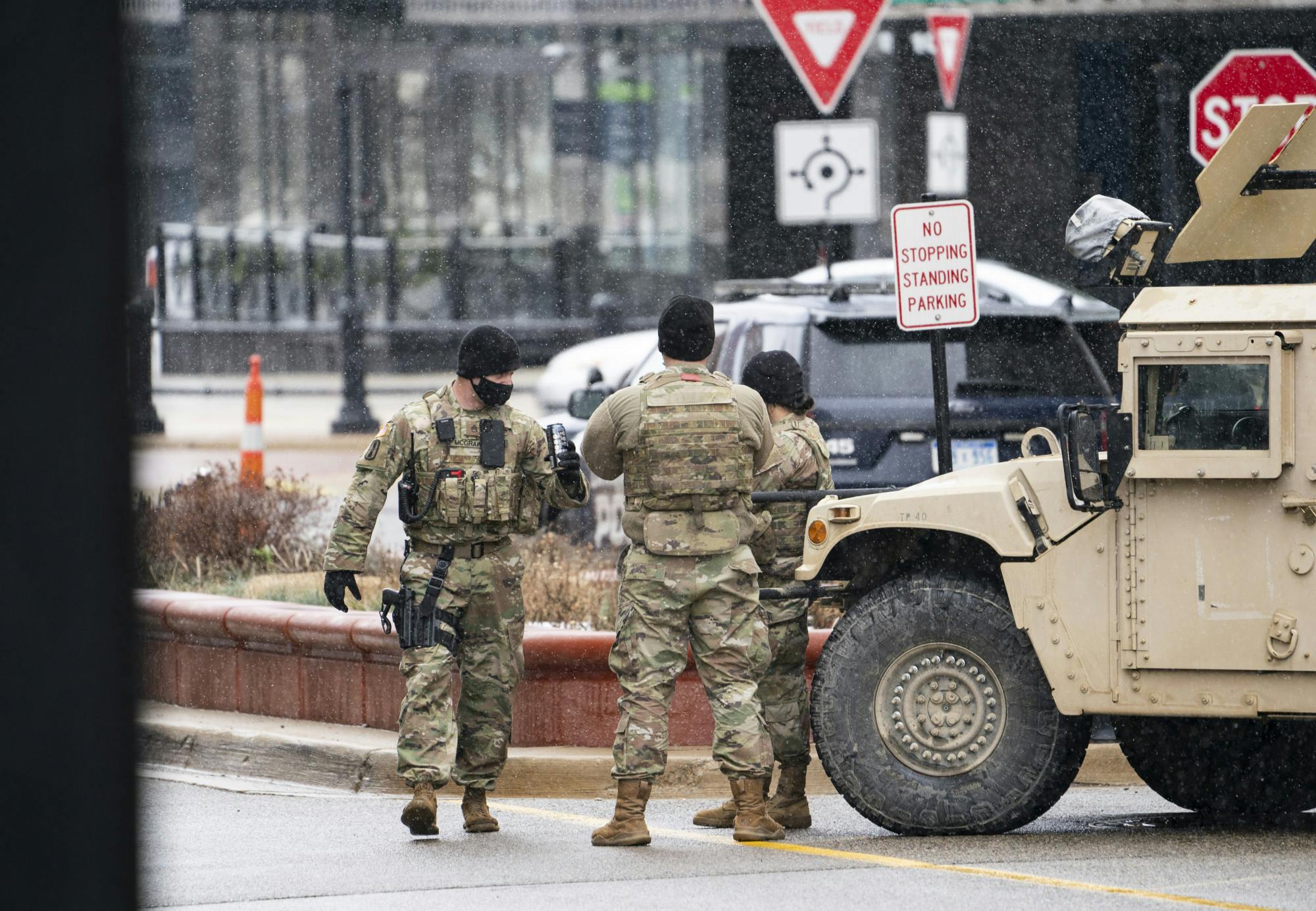Domestic terrorism, militias and armed protests have become increasingly prevalent at the national and the state level.
Protesters armed with rifles gathered at the Michigan Capitol numerous times during the stay-at-home order last April. The Federal Bureau of Investigation (FBI) caught over a dozen men who plotted to kidnap Gov. Gretchen Whitmer in October 2020. Insurrectionists stormed the U.S. Capitol on Jan. 6. resulting in five deaths, including a Capitol police officer.
Steve Chermak, an MSU professor in the school of criminal justice, defined domestic terrorism as politically motivated criminal activities “designed to promote fear and create publicity.” He began studying domestic terrorism after the Oklahoma City bombing in 1995 and concluded that far-right extreme terrorist acts have been a significant threat since the mid-’90s.
Militias are uniquely prevalent in Michigan despite their ties to domestic terrorism. In 1994 air-force veteran, Norman Olson founded The Michigan Militia. According to its website members of the militia are “American citizens (that) have concerns with corruption and abuses in our government, local, state and national.” It was discovered that the militia had relations with Timothy McVeigh, who is responsible for the Oklahoma City bombing.
Several of the men who plotted to kidnap Whitmer and overthrow the government were members of the Wolverine Watchmen, another militia in Michigan. Attorney General Dana Nessel filed 19 felony charges against Paul Bellar, Shawn Fix, Eric Molitor, Michael and William Null, Pete Musico and Joseph Morrison for the kidnapping plot.
State officials have also been found to be associated with militia groups and the Jan. 6 insurrection at the U.S. Capitol. Among them was Michigan Senate Majority Leader Mike Shirkey (R-Clarklake). He was spotted at a rally in Grand Rapids last May with some of the men charged for the kidnapping plot.
A video surfaced Feb. 4 of Shirkey calling the attacks on the Capitol “staged.” He accused Senate Majority Leader Mitch McConnell of participating in the attack saying, “he was a part of the decision making on how much security they wanted to have on staff. I think they wanted to have a mess.”
He retracted those statements in a press release five days later.
“I said some things in a videoed conversation that are not fitting for the role I am privileged to serve,” Shirkey said. “I own that. I have many flaws. Being passionate coupled with an occasional lapse in restraint of tongue are at least two of them. I regret the words I chose, and I apologize for my insensitive comments.”
On Feb. 10, Michigan Democrats called for Shirkey’s resignation.
The New York Times also reported other Michigan officials had ties with vigilante groups including co-chair of the Michigan GOP Meshawn Maddock and Ryan Kelley who is a member of the planning commission in Allendale.
Maddock loaded buses to Washington D.C. on Jan. 6 for the insurrection at the U.S Capitol. Then She retweeted a video of rioters at the Capitol saying “The most incredible crowd and sea of people I’ve ever walked with.”
Kelley was also seen in videos at the U.S Capitol Jan. 6. The Michigan Tea, an independent news outlet, tweeted a video of Kelley destroying federal property and running up the stairs of the Capitol. This news comes just weeks before he announced his bid for Michigan governor in 2022.
Misinformation, disinformation, social media and division.
False beliefs of widespread voter fraud led up to the attack on the U.S Capitol on Jan. 6. Former President Donald Trump often said that “the election was stolen” from him. States that Trump accused of voter fraud, including Michigan, Pennsylvania and Arizona, all concluded that there was no evidence of fraud.
“In the last four years and the last year, things really have intensified in terms of race-based rhetoric about different issues," Chermak said. "I think a lot of those ideological battles have occurred on social media sites. ... A lot of that (radicalization) has caused some deep divisions. A lot of people have burrowed into an ‘us vs. them’ mentality.”
Following the attack on the Capitol, Trump was banned from several social media sites including Facebook, Instagram, Twitter and Snapchat.
“There has to be some reckoning with how we talk publicly about important issues,” Chermak said. “... The amount of disinformation that occurs in misinformation, those are all threats to democracy.”
As public officials reckon with domestic terrorism, misinformation and disinformation, Michigan remains in a unique position as a swing state with a history of militias, a kidnapping plot, armed protests earlier last year and ties to the Jan. 6 insurrection. In January, Michigan banned firearms at the state capitol.
Support student media!
Please consider donating to The State News and help fund the future of journalism.
Rep. Elissa Slotkin (MI-8) also addressed ongoing domestic terrorism in her state of the district address on Wednesday. Before running for office, Slotkin was recruited by the Central Intelligence Agency as the Middle East analyst. She served three tours in Iraq as a militia expert. She was recently appointed Chair of the House Intelligence and Counter Terrorism Subcommittee, a subcommittee within the Homeland Security Committee.
“In line with my background we need to take on the emerging threats of domestic terrorism and cyber attacks,” Slotkin said. “As recent events have laid bare, our single greatest threat to national security is the internal division in our own county.”
Discussion
Share and discuss “Domestic terrorism, militias and division: Professor Steve Chermak weighs in” on social media.







